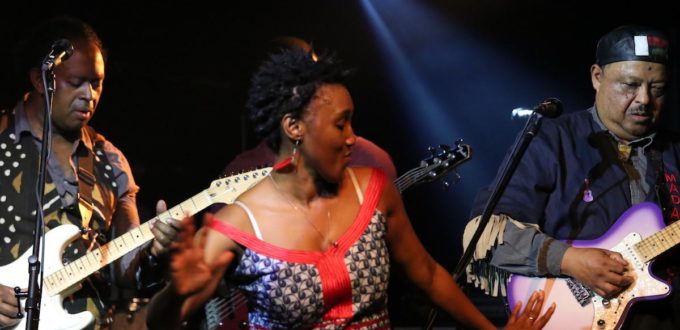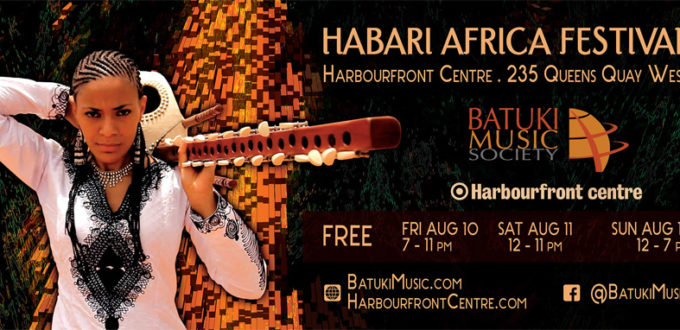As part of this month’s Polyphonic Ground Digital Residency, we’re profiling the organizations and professionals who support Toronto’s culturally diverse music scene. See all of the profiles here.
 What’s your name, title and organization?
What’s your name, title and organization?
Nadine McNulty, founder, Batuki Music Society.
Tell us about Batuki Music Society’s signature events.
Since 2008, Batuki Music Society has presented over 250 concerts in Toronto featuring local, national and international artists. Our organization launched the inaugural Habari Africa Festival at Harbourfront Centre in 2014, a multi-disciplinary music and arts festival that displays the rich and diverse cultures of Africa. This year’s festival will take place from August 10-12 at the Harbourfront Centre.
Habari Africa is a free festival for all ages, featuring music, dance, films, workshops and children’s activities that celebrate the uniqueness, wealth and diversity of African arts and culture. Our organization presents an African music concert series at the Alliance Française and various venues in the city throughout the year.
Some milestones include curatorial projects like the 2017 Juno award-winning Okavango African Orchestra, Songs of My Mother, Ethiopia: A Musical Perspective and Spiritual Songs of Sub-Saharan Africa. Our audience is varied and made up of all ages from the diverse communities that reside in the province.
Beyond providing great cultural programming, does Batuki Music Society have a larger mission you’re working towards?
The organization actively seeks out local artists and works with them by helping find performance venues, advice on career development, recording, touring and management. Batuki Music Society provides visibility and necessary publicity to African artists by placing them in concerts and festivals in mainstream venues.
Our artistic vision is to encourage local African musicians to participate in enriching the diverse arts and cultural scene that is found in this beautiful city through live music shows, arts events and festivals. The organization also provides mentoring and opportunities for African youth interested in gaining skills and knowledge in the arts practice.
Tell us about one highlight from a past Batuki Music Society event that illustrates why you love what you do.
Okavango African Orchestra – 12 instruments, 10 languages, seven countries. This is an ambitious music project created by Batuki Music Society, a non-profit African arts organization based in Toronto. Artistic director Nadine McNulty assembled a cast of eight accomplished African-born artists who live in Toronto and Montreal: Daniel Nebiat (krar-Eritrea), Donne Roberts (guitar-Madagascar), Ebenezer Agyekum (bass-Ghana), Kofi Ackah (percussion-Ghana), Nicolas Simbananiye (vocals-Burundi), Tichaona Maredza (nyunga-nyunga, hosho, guitar-Zimbabwe), Sadio Sissokho (kora, tama, djembe-Senegal) and Mabinty Sylla (dance-Guinea).
The orchestra takes its name from the Okavango Delta, a basin in the Kalahari Desert in Botswana, where many different animal species come together to feed and find water. Predators and prey are forced to coexist and share the meager resources because of the harsh environment around them. Similarly, Okavango brings together the traditional music and instruments of several major African cultures that historically have had little or no interaction. The musicians of Okavango have created a common meeting place for these disparate cultures, and a new musical language that harmonizes their different tuning systems, rhythms and timbres. The musicians and instruments of Okavango represent a continuum of traditions and cultures from time immemorial to the present day. The multicultural spirit of modern-day Canada bridges ancient African solitudes. Okavango African Orchestra was awarded the 2017 Juno for World Music Album of the Year for their debut self-titled album.
Describe some of the specific challenges organizations like yours face in promoting world music in Toronto.
African musicians, dancers and artists are facing many barriers in accessing resources and the necessary promotion to make their work visible. Our work is contributing to the city’s diverse and continuously changing art form and artistic field by presenting African music on an annual basis. Our work is distinct because we deal with diverse musical genres, and artists who are very talented in their fields but have difficulty integrating into the Canadian arts landscape. Our programming includes a large number of local, national and international artists, women and emerging young artists. We feel that our contributions to African music, arts and culture in the province is significant and has made a great impact on many artists careers, as well as various African communities.
Batuki Music Society has become a referral hub in the province for artists and presenters of African music. We strive to secure adequate resources that can fund our activities and increase our capacity to present more programming and be inclusive of the many communities in the city. This will help to provide necessary visibility to African artists and advance their careers through being included in our year-round programming.
Name one artist, band or performer who’s taking part in an upcoming Batuki Music Society event that you think audiences will love.
Sona Jobarteh, a Griot and female Kora player from Gambia will perform at the Habari Africa Festival on August 10 at Harbourfront Centre. As the granddaughter of the master Griot Amadu Bansang Jobarteh, and cousin to Kora maestro Toumani Diabaté, she has a long history of traditions running through her performances but still finds ways to break away from them too. Her success has been on the rise since the release of her album Fasiya. This free concert will be her debut performance in Toronto.
Toronto music venues have been struggling to stay open in recent years. Have these challenges affected Batuki Music Society in any way?
A programming challenge for our organization is the lack of adequate venues, we often have to compete with a large pool of promoters to book space far in advance, and a few of the venues would not grant weekends for African music concerts, therefore presenting in weekdays results in a significant loss of potential revenue. It is difficult to secure space on appropriate dates to present artists that require various types of spaces with different capacities – such as theatres, concert halls, clubs and festival stages. Some venues have high rental costs and others lack adequate production on site. We receive requests from local, national and international performers for bookings in Toronto and are unable to present many of them due to these challenges.
What are some of the benefits of partnering together with similar music/event promoters in Polyphonic Ground?
Some of the benefits of partnering with other presenters in Polyphonic Ground include building audiences for our activities through cross-promotion to their audiences, professional development opportunities, working together for advocacy for these diverse art forms, strengthening cultural communities through the arts and sharing resources, skills and knowledge with other professional presenters.
Visit the NOW Digital Residency: Polyphonic Ground
Tags
Polyphonic Ground Small World Music Polyphonic Ground Profiles

